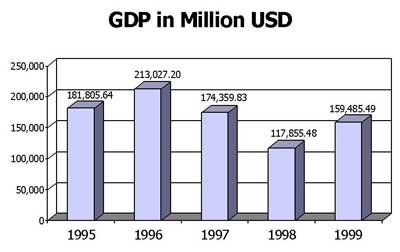Although the Indonesian economy experienced fits off rapid growth throughout its colonial and independent life, the Indonesian economy faced numerous issues, leading it to its place in today’s modern world as rank number 18 in GDP per capita by the International Monetary Fund (IMF) in 2010.
Before Indonesia’s relief from imperialistic rule, the economy of Indonesia experienced a sustainably large economy followed by a fit of economic downfall. A term of which many people are familiar is that of the Dutch East India Trading Company, which domineered Indonesian economy for the majority of its colonial life, until its dissolution in 1798. Toward the end of WWII, the Japanese held control of the colony, leading to the creation of independence feelings within the region, which lead to further conflict and economic stagnation.
In Indonesia’s pursuit of independence and freedom from its two overwhelming imperialistic controllers, as well as following its victory in this momentous struggle, Indonesia’s economy faced missed opportunities and suppression. During Indonesia’s independence struggle following the Japanese surrender to the Allies in 1945, the Dutch were forming post-war plans to create a Netherlands and Indonesian Common-wealth, by which Indonesia would become an economic equal to their governing power the Netherlands, but these plans dissolved when the Netherlands were forced to relinquish their hold on Indonesia and grant it complete independence in the post-WWII decolonization movement. Following its independence, however, Indonesia’s economy faced numerous issues threatening its expansion and flourishing, such as political turmoil and oppression by two independent dictators, Sukarno and Suharto, numerous wars and conflicts within Indonesia’s innumerable islands and with the greater powers of the modern world, and that of Indonesia’s climate restrictions and its diversity of people, all leading to the suppression of what could have been the greatest economy of the modern world.
Aftermath of the tsunami
http://www.tsunamispecialenvoy.org/wp-content/uploads/2010/02/Indonesian-Tsunami.jpeg
The first “president” of Indonesia, Sukarno, further suppressed the economy with his communist political tendencies and his bloodthirsty endeavors into unification and even imperialism, while the newer Suharto, while allowing the economy room for immense expansion, still limited the growing economy from reaching its full potential. Under Indonesia’s first life-long elected dictator, Sukarno, the independent nation’s economy was first suppressed by a strong military presence in economic affairs due to the seizing and nationalization of Dutch businesses, as well as the occupation of the abandoned Dutch businesses, throughout the duration and in the epilogue of the Indonesia-Netherlands Conflict over the ownership of West New Guinea. Also, under Sukarno, Indonesia leaned toward a more communist approach to politics, possibly leading to more suppression of the economy. Under the new dictator, Suharto, elected two years before the death of Sukarno, Indonesia’s economy actually accelerated, with Suharto looking to the United States for aid in revitalizing the damaged economy. He shut down frivolous spending and costly wars, and managed to gain international interest, procuring for the country hundreds of millions of dollars in aid. Within a couple of years, the economy had returned to a higher standard. Unfortunately, Suharto’s regime did not come without its economic obstacles, as when the currency crisis struck Southeast Asia, Indonesia fell also, as did its currency, the rupiah. Following Suharto’s fall from leadership following numerous reelections, it was discovered that he had embezzled billions of dollars from the country, also suppressing Indonesia’s economic growth substantially.
In current times, Indonesia faced a horrific disaster in 2004, when the tsunami hit the island of Sumatra, on the 26th of December, 2004. Nearly half the deaths of this nature-made colossal expanse of water were for Indonesia, which lead to an obvious effect on the economic growth and sustainability of the nation.
GDP of Indonesia
http://www.isoc.org/inet2000/cdproceedings/7c/7c_3a.jpg
In even more recent times, the economy thrives once more, with an expected increase of 6.4% in 2011. The Finance Minister of Indonesia, Agus Martowardojo, predicted this in June, 2010, also saying “We hope growth can be supported by household consumption that stays strong, the improving investment climate and the increase in export activities”. The current main exports according to the United States Department of State include oil, natural gas, crude palm oil, coal, appliances, textiles, and rubber.
Although Indonesia is haunted by “what could have been”, Indonesia holds strong prospect to “what still may be”, as the nation, freed from the majority of its political turmoil and hopefully rid of its diversity and climatic issues, as well as free from the reins of western hegemony, accelerates forward as a leading economic power.
Monday, June 6, 2011
Subscribe to:
Post Comments (Atom)


0 comments:
Post a Comment